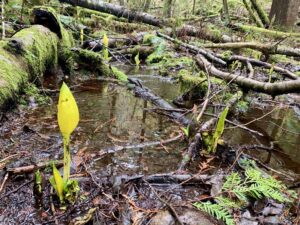
It dawned on me last week, as I walked by a band playing jingle bells in the middle of my university campus, that the holidays are upon us. I have been grappling with how hard this time of year actually is for so many of us. The holidays, with the assumption of togetherness, joy, family, and cheer, can lead us to feel the distance between our own experience and that ideal. Twinkling lights and gift wrapping seem to suggest that we should be happy and spending time with the people we love. Reality may feel very different for those who are grieving losses, separate from family, or simply struggling with life being not as “I imagined it.”
So, what to do with holiday despair? As a psychotherapist I attempt to be with my clients in whatever they are feeling. How can you be with yourself with whatever is arising inside of you? What might it be like to touch into the sorrow, sadness, perhaps the envy, or longing that is there right now, and to feel its shape, its texture? Can you take a breath there, noticing it, exactly as it is? For me, this inner noticing is always the first step. The noticing alone seems to invite a more softened, compassionate presence. Next, can you bring some soothing to the ache inside of you?
Reach out to a friend, take a breath, take a bath, go for a walk. In this beautiful place where I live, in Squamish, where granite mountains meet the sea, the natural world has such medicine to offer us. Can you reach out and welcome it in? Can you find gratitude in what is right in front of you?
Gratitude can feel like a trite response in the face of great distress—but research tells us that it actually can make a big difference to mental health outcomes. Wong and colleagues (2018) conducted a study with 293 adults who were seeking psychotherapy services. Participants were randomly assigned to one of three conditions: (1) psychotherapy only, (2) psychotherapy plus expressive writing, and (3) psychotherapy plus gratitude writing. Upon completion of the study, participants in the gratitude condition reported significantly better mental health than those in the other conditions. Further, the gratitude group used more “we” words and positive emotion words and a lower percentage of negative emotion words than expressive writing group. So, what are you grateful for?
For some inspiration here are some words by David Whyte:
“GRATITUDE is not a passive response to something we have been given, gratitude arises from paying attention, from being awake in the presence of everything that lives within and without and beside us. […]
Gratitude is the understanding that many millions of things must come together and live together and mesh together and breathe together in order for us to take even one more breath of air, that the underlying gift of life and incarnation as a living, participating human being is a privilege; that we are miraculously, part of something, rather than nothing. Even if that something is temporarily pain or despair, we inhabit a living world, with real faces, real voices, laughter, the color blue, the green of the fields, the freshness of a cold wind, or the tawny hue of a winter landscape. […]
Thanksgiving happens when our sense of presence meets all other presences.
Being unappreciative might mean we are simply not paying attention.”
From ‘GRATITUDE’ In CONSOLATIONS: The Solace, Nourishment and Underlying Meaning of Everyday Words. Revised Edition David Whyte and Many Rivers Press 202
Wong, Y. J., Owen, J., Gabana, N. T., Brown, J. W., McInnis, S., Toth, P., & Gilman, L. (2018). Does gratitude writing improve the mental health of psychotherapy clients? Evidence from a randomized controlled trial. Psychotherapy Research, 28(2), 192-2028.


